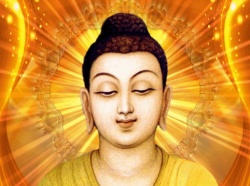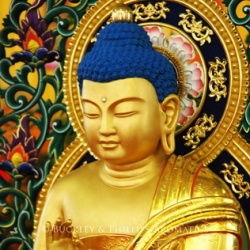Manual of Madhyamika - Reading Ten: The Perfections of Giving and Ethical Living
The following reading is taken from the Entry Point for Children of the Victorious Buddhas (rGyal-sras ‘jug-ngogs), a commentary by Gyaltsab Je Darma Rinchen (1364-1432) on the book called Guide to the Bodhisattva’s Way of Life (Byang-chubsems-dpa’i spyod-pa la ‘jug-pa) by Master Shantideva (c. 700 AD).
Here is the third part, [which is advice that you should involve yourself only with virtuous activities). This part has three sections of its own: advice to perform the act of giving towards exceptional objects; advice to perform virtuous activities on one’s own accord; and advice to develop the perfection of giving ever higher, and to act after once one has examined the purpose of acting.
Is so much more powerful
If done all the time,
Motivated by strong enthusiasm,
Only by the antidote, or performed
Towards objects of high spiritual qualities,
Those who’ve been of great benefit,
Or those who are suffering.
Here is the first. Since the power of the virtue is so much more powerful, I should exert myself in the following kinds of virtuous activity:
- Giving which is done “all the time,” meaning on a regular basis;
- That which is motivated by strong enthusiasm—performed with fierce good feelings;
- That which is motivated only by attitudes such as a lack of attachment—by thoughts which provide the antidote for negativities;
- That which is performed towards the highest objects: objects of high spiritual qualities such as the Three Jewels or the like, and objects who have been of great benefit, such as your parents;
- That which is performed towards objects which are suffering—the poor and the like.
I should become a master, and learn
To have great faith and enthusiasm;
They will lead me to perform deeds at all times.
I will learn to accomplish all kinds of virtue
Even if there’s no one else at all
On whom I can depend.
Here is the second. I should become a master of engaging in those actions which are to be taken up, and of avoiding those actions which are to be abandoned. And I should learn to have great faith and enthusiasm for virtuous deeds. These then will lead me to perform virtuous deeds at all times. And I will not perform these good deeds only because others have induced me to do so; I will learn to accomplish all kinds of virtue even if there is no one else at all on whom I can depend to help me.
I will perform the perfections
Of giving and the rest
So they are heightened ever further,
And never give up the greater for the less:
Concentrate on others’ aims.
Here is the third. I will perform the perfections of giving and “the rest,” meaning all of those up to wisdom, in such a way that they are heightened ever further; that is, so they increase in strength. Whenever I engage in the perfections of giving, an ethical way of life, or any of the others, I should never give up activities which are of greater virtuous power for those which are of less—I should rather concentrate my efforts on the greater.
These lines are indicating, by implication, the following: where one is unable to perform both the action of lesser power and the one of greater power—where a time has come where one must choose between the two—then we should give up the deed of lesser virtue to prevent the greater one from being lost. How do we establish which deeds are greater, and which are lesser? If for example there is a choice between accomplishing one’s own aims or someone else’s aims in this present life—if by bringing about one you would lose the other—then you should concentrate on others’ aims.
The third general section concerns training oneself in the ethical way of life in which one acts for the benefit of others. Here there are three parts: throwing oneself into the service of others; acting in ways which attract others to the teaching, while still striving to avoid being sullied by any bad deeds oneself; and training oneself in ways to preserve the opinions of others, and acting so that one is left unsullied by bad deeds.
They should in this way learn,
And then make efforts always
To fill the needs of others.
Those who possess compassion,
Who see the distant, have allowed
Even the prohibited.
Here is the first. One may ask the following question: “Bodhisattvas should, in this way mentioned above, learn the art of which actions to take up, and which to give up. And then they should always make efforts to fill the needs of others. Isn’t it true though that, because filling the needs of others may require us to undertake a wide variety of different actions, we might ourselves become sullied by some bad deeds?”
Those who possess compassion, the Buddhas, see directly even those objects which are “distant,” in the sense of being abstruse. There are certain actions, like the seven bad deeds of body and speech, which they have prohibited for listeners—for those who are working primarily for their own aims. On certain extraordinary occasions though, they have allowed even these same actions to bodhisattvas; when such persons perform these acts they are not only not a bad deed, but rather become the accumulation of great goodness.
The Sutra on Skilful Means, the Great Secret, for example mentions the ship captain named Great Compassion, who killed evil persons and thereby erased many eons of his future suffering in the cycle of life. There is also the incident that is stated to have occurred with the Brahmin youth named Karma. The phrase “those who possess compassion, who see to a distance” can also be explained as referring to these bodhisattvas—the ones for whom the seven deeds of body and speech are allowed—themselves. [It should be noted at this point that the practice of performing one of the seven bad deeds for great goodness is severely restricted, to those who have been practicing the bodhisattva path literally for millions of years, and should not be construed as allowed for others.]
The second part has two of its own: attracting others to the teaching through the use of material things, and attracting them through the Dharma. The first of these has three further sections: an explanation of the distinction between when to give food and clothing, and when not to give them; advice not to harm the body in order to accomplish some minor deed; and a description of the time and purpose when it would be appropriate to give up even one’s own body.
I should offer an equal share
To those who have fallen wrong,
Who have no one to protect them,
Who are engaged in asceticism.
I myself should eat only the proper amount,
And give away any possession
Except for my three dharma robes.
Whenever I partake of food, I should also offer an equal share to each of the following, should they be present: to “those who have fallen wrong,” meaning animals and tormented spirits; to the sick and others who have no one to protect them; and to those “who are engaged in asceticism”—referring to celibate, ordained persons.
I myself should follow the advice expressed in the phrase, “In all things judge the proper amount,” and eat only the proper amount of food, without committing any of the inappropriate deeds which relate to partaking of food. The motivation and such for eating should be the same as that described in the Letter to a Friend.
A bodhisattva who is a fully ordained monk should be ready to give away any possession he has, with the exception of his three dharma robes: his outer robe, his inner robe, and his lower robe. Even with these three robes, the bodhisattva may give away any extra ones that he may have, but may not give away those where he has no more than one, since this would be an obstacle to his practice of celibacy.
With my body; I should never harm it
For some minor benefit.
If I am able to act this way,
Then I can quickly fulfil
The hopes of every living being.
Here is the second section. My body is a base from which I carry out the holy Dharma; it is something with which, if I care for it properly, I can accomplish vast purposes for myself and others. I should never do any kind of harm to it merely for some minor benefit that it might do for someone else—I should shield it in the same way I would an open wound. Why is this so? Because if I am able to act this way, then I can—by using the spiritual leisure and fortune which I’ve found—reach the culmination of the practice of the three trainings, and in this way quickly fulfill the hopes of every living being. As the Four Hundred Verses says,
We should admittedly view this body
as though it were the enemy;
But all the same it is a thing
we must protect as well.
It is an action which creates
tremendous stores of merit
maintaining one’s morality.
I should never give away my body
With impure thoughts of compassion.
I should no matter what give away
My body, to achieve great goals
In both this and the future.
Here is the third part. It is admittedly true that bodhisattvas do, from the very beginning, offer their own bodies and the like to living beings from the very bottom of their hearts. I should never though perform the asceticism of giving away the flesh of my body or something of the like to someone who requests it in a way which involves an impure version of the thoughts of compassion where I am supposed to cherish others more than myself; that is, in such a way that I would feel distaste, or regret my offering later, or anything of the like. This point is expanded upon in the Compendium of Training, where a sutra is quoted which states that giving away things at the wrong time is the work of demons.
When there comes a time however when I have, on my side, freed myself from stinginess and other obstacles to the perfection of giving, and when I could without any problems thereby accumulate a great deal of virtuous energy, then I should no matter what give away my body, for this would act as a cause for me to achieve great goals in both this and all my future lives. Here is the second part from above, about attracting others to the teachings through the Dharma. Here there are three points: notes on the proper behavior of a person who is listening to the Dharma—that is, a description of persons to whom it would be improper to teach the Dharma; learning to judge details of the state of mind of the person who is to receive the teachings; and instruction not to take a person who has an aptitude for the wide-reaching path and introduce them to one which is lesser.
I should not teach the Dharma
To those who have no respect;
To those not ill wearing veils;
Who hold an umbrella, staff, or weapon;
Or who cover their heads with cloth.
Here is the first. I should not teach the Dharma to those who have no respect for the Dharma, or no respect for the one teaching the Dharma. Nor should I teach the Dharma to those who exhibit certain kinds of behavior, such as wearing veils or the like (assuming they are not doing so because they are ill); holding an umbrella, a staff, or some weapon; or covering the tops of their heads with cloth or such.
I should not teach the profound
And far-reaching aspects to the lesser,
Nor a woman without a male.
I should follow the behavior
Of respecting all Dharma equally,
No superior or inferior kinds.
Here is the second. I should not teach the profound and far-reaching aspects of the Dharma to those of lesser minds, to those who are not fit to receive these teachings. Nor should I teach the Dharma to a woman alone, without another male present. It is further stated that one has committed the bad deed of rejecting the Dharma if one discriminates between different parts of the teaching, by saying for example that the teachings of the greater and lesser ways are, respectively, superior and inferior kinds of Dharma—one better than the other; one more proper than the other; one a way to enlightenment, and the other not; or anything of the like. I should therefore follow a code of behavior where I respect all of them equally, and put each of them into practice.
I should never take one who is fit
To receive the teachings of the far-reaching
And introduce them to a teaching which is lesser.
Neither should I ever abandon the code
Of behavior, nor abuse the open and secret
Teachings through deceiving someone.
Here is the third. I should never take a person who is the type who can follow the greater way, one who is fit to receive the teachings of the far-reaching way, and introduce them to a teaching which is lesser—that is, I should never lead them along the path of the listeners. This is because it is stated that, should I do so, I will have committed a transgression of my vows.
Neither should I ever abandon the code of behavior contained in the morality of restraint: I should never abuse the open and secret teachings through deceiving someone who is fit to receive their actual content by telling them that, to make themselves pure, all they need to do is to recite the open and secret teachings out loud.
Here is the third overall section from above, which concerns training oneself in ways to preserve the opinions of others, and acting so that one is left unsullied by bad deeds. Here there will be an expanded explanation followed by a summary. The former of these two has three parts of its own: giving up physical actions which are wrong, and anything which would cause others to lose their faith; how to act when pointing out a road, or something of the like; and how to undertake the act of sleeping.
I should, whenever I throw out
The cleaning stick, or spit,
Cover them up.
Disposing of urine or anything similar
In water or on a piece of ground
Which others use is rebuked.
Here is the first. Bodhisattvas who have also left the home life must, except in those cases which are specifically allowed, strictly maintain each detail of the code of behavior spoken in the collection of scripture devoted to discipline, which is something shared by both the greater and lesser ways. And even those bodhisattvas who are still leading the home life must as well maintain these points, in order to preserve the faith of others.
Therefore I should—whenever I throw out the so-shing stick which I use to clean my mouth, or whenever I spit—cover them up with dirt or the like. And since I would be rebuked by the powerful pleasure creatures and other such beings if I did so, I should avoid ever disposing of excrement or urine, or else mucus from my nose, or anything similar in water or on a piece of ground which others use along with me.
I should never eat with my mouth stuffed,
Nor with noise, or with my mouth open.
Neither should I stick my legs out while I sit
Nor rub my shoulders together.
I should never eat in such a way that my mouth is totally stuffed with the food, or so that I make a loud smacking noise or anything of the like, or else with my mouth wide open. When I sit on a Dharma throne or similar seat, I should never stick my legs out touching the ground, or such. Neither should I rub myself on my shoulders together, meaning at the same time. It is however no fault if you rub yourself on your shoulders one at a time.
I should never stay in or on
A single conveyance, a single bed,
Or in the same place with another
Who is a woman. I should avoid
Any kind of behavior which might cause
People of the world to lose their faith,
Whether the obvious or the acquainted.
[As a monk,] I should never stay in or on a single conveyance, something like a horse or the like, or on a single bed, or in the same place with another person who is a woman. Even those bodhisattvas who are laypeople should avoid staying together with women who are not their own relatives.
In brief, I should avoid any kind of behavior which might cause people of the world to lose their faith, whether it is behavior that is obviously a problem to everyone everywhere, or whether it is something peculiar to that particular place or time, and therefore something that I might not already be aware of, but would have to acquaint myself with.
I should never point something out
With my individual fingers,
But rather use all my right hand,
Right and with respect.
Thus too should I guide
Any person along a way.
Here is the second. When I am pointing out something to someone, I should never do so with individual fingers of my left hand, since this would be something insulting them. Rather I should point with an attitude of respect, using all the fingers of my right hand, and turning it palm up, right. This too is the manner in which I should guide any person along a way.
I should never gesture with my hands
In a very animated way, but rather
Move them only a slight bit
And make some type of noise
Or snapping with them.
Were I to act differently though
It would show a lack of control.
Unless there is some specific purpose to be served by doing so, I should never gesture with my hands in a very animated way, since this might lead me to become careless. Rather I could move my hands only a slight bit, and make some type of a noise or snapping with them. It would though show a lack of controlled behavior if I were to act differently, and make this noise too loudly.
I should sleep in the desired direction,
In the way the Savior laid down in “nirvana,”
With awareness from the very beginning
I should be sure to rise up quickly.
Here is the third. Whenever I go to sleep, I should emulate the way that the Savior acted when he laid down and pretended to pass into “nirvana.” That is, I should first lie with my head in the desired direction. Then I should lay with my right side down, and place my left leg atop my right. I should put my head down on my right hand, and wrap myself nicely in my dharma robes, and sleep.
As I go off to sleep I should place my mind on a virtuous object, and utilize the attitudes of recollection and awareness. From the very beginning, as sleep comes, I should be sure to keep a very luminous state of mind, where light fills my mind, and I should reflect upon how I will rise up from my sleep quickly. As I drift off I should think of how I am about to sustain my body with the sleep, and then afterwards make great efforts in performing virtuous deeds.
The different types of activities
Described as something that bodhisattvas
Should undertake are limitless.
I must acquaint my mind with them,
And practice til the time arrives,
As it surely will, when I can
Here is the second point from above. The various scriptures, and the commentaries which explain their true intent, describe different types of activities to be undertaken by bodhisattvas, activities which are unlimited. I would never be able to accomplish each and every one of these at present. Therefore from the very beginning I must, as mentioned above, acquaint my own mind with these activities, and practice until the time arrives, as it must, when I can put in my own life each and every one of these ways of living.
See Also
- Manual of Madhyamika - Reading One: Author, Structure, and History of the Text
- Manual of Madhyamika - Reading Two: The Benefits of the Wish for Enlightenment
- Manual of Madhyamika - Reading Three: How to Make Offerings
- Manual of Madhyamika - Reading Four: The Four Forces of Purification, Part One
- Manual of Madhyamika - Reading Five: The Four Forces of Purification, Part Two
- Manual of Madhyamika - Reading Six: Taking Joy
- Manual of Madhyamika - Reading Seven: How to Fight the Mental Afflictions, Part One
- Manual of Madhyamika - Reading Eight: How to Fight the Mental Afflictions, Part Two
- Manual of Madhyamika - Reading Nine: Awareness
- Manual of Madhyamika - Reading Ten: The Perfections of Giving and Ethical Living
- CLASS NOTES 1
- CLASS NOTES 2





